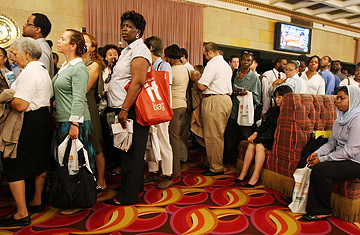
People wait to enter a diversity job fair at the Affinia Hotel in New York City on June 10
In years past, walk-ins were rare at Tracey & Associates, a small employment agency in Providence, R.I. The office sits about four blocks from the downtown foot traffic, and new clients looking for job placement tended to call ahead for information or appointments. But lately people are appearing at the door on the off chance that an in-person cold call will quickly lead to work in an area hard hit by rising unemployment. "All of a sudden in 2008, people are just coming in blindly," says Kerry Tracey, founder and president of the firm. "From brick layers and carpenters to attorneys."
Rhode Island's unemployment rate is at 8.8%, the highest in the country and well above the national average of 6.1%, according to the most recent data available from the Bureau of Labor and Statistics. But Rhode Island's situation is hardly unique as the effects of the nation's economic downturn gather pace amid the ongoing financial turmoil. Twenty-one states have unemployment rates above the national average, with Michigan and Minnesota showing rates near Rhode Island's to make up the top three. Unemployment figures are certain to rise when the bureau releases its next set of figures on Nov. 7. Some economists are predicting that unemployment will go higher than 8% nationwide before the end of the year and continue to climb toward the modern record of 10.8%, seen in 1982.
Unemployment is going to be a problem even though many economists view the current economic crisis on the whole as a rough patch with a foreseeable end. Some optimistic forecasts show GDP growth slipping until sometime in the latter part of 2009, when it is expected to inch upward again. But even an uptick in broad economic indicators after next year is unlikely to ease unemployment. The high unemployment rates taking shape now are likely to hover near record levels for some time, because economic recoveries in recent decades have tended to go forward without generating many jobs.
Economist David Levy, chairman of the Jerome Levy Forecasting Center, says economic downturns up to and including the one in 1982 have largely revolved around temporary shocks to the economy such as high oil prices, backed-up inventories, lofty interest rates and other problems responsive to sharp correctives — after which unemployment rates eased in step with other recovery indicators. More recent recoveries from economic downturns, however, have tended to go forward without major gains in employment, a reflection of the fact that the underlying economic problems of modern recessions have been more complex and therefore more difficult to solve. Levy thinks the same dynamics are in play now as the economy struggles to regain its footing after being sunk by complicated issues such as capital flows and deflation of assets and debt — all of which choke off cash flows among big employers, who then trim payrolls. "You can't just clean these things up by having the economy go through a year of cutting inventories and dropping interest rates," says Levy. "The problems linger."
For the thousands facing joblessness, lingering economic problems mean deepening financial difficulties. In September, the last month data were available, the economy nationwide shed 159,000 jobs; thousands of additional layoffs have been announced by major employers around the country since then. Tracey says many of her clients seeking employment are already getting desperate. One lost a home recently and is living with relatives. Some clients are scrambling to accept even temp positions that pay far less than the jobs they held before the layoffs. Others reveal a growing sense of fear simply in their voices when talking on the phone with Tracey, who says that most people eventually find some kind of employment. "It's not completely a black hole here," says Tracey, whose firm has a database of about 1,000 job seekers. "It's just taking a long time, even for the best people."
